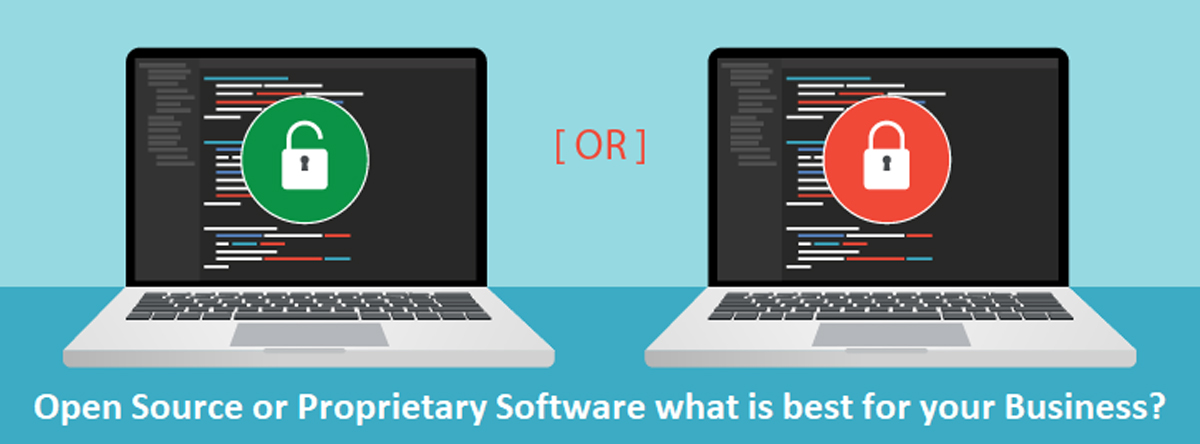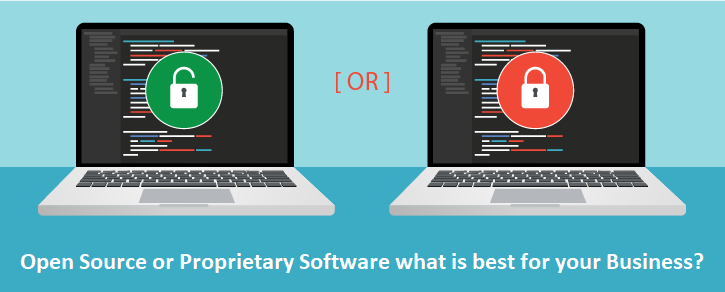Open Source or Proprietary Software what is best for your Business?
Preface
Three decades ago no one of an open source or free to air concept, but it came into existence almost two decades ago. Yet debates transpire about its usefulness and disadvantages. However, mass percentile benefits can be achieved from it as it is affordable & highly customizable for innovation-driven businesses.
Open source software is fundamentally related to sharing and gaining wisdom from the communities. Open source software is still gaining popularity compared to proprietary software and is burgeoning as more and more people are getting involved in modifying and expecting better software code. Open Source and proprietary development produce highly usable software. However, making a better choice is more or less nuanced apart from picking a favourite ideology. While one can run the expensive Red Hat license, there is CentOS from open source with equal or higher benefits at disposal and is absolutely free or open to the source. Without open source the online world can be more expensive, but less powerful, accessible to only limited percentile of mass, would be less innovative with no DevOps.
Let’s differentiate between the two considering advantages & disadvantages.
Advantages of Open Source
- Cost
The main and primary advantage of open source software is the cost which is next to nothing. The term “free” can be coined with overall cost and more to do with freedom from restrictions. The cost which is saved can be utilized for several other things like infrastructure, building up speedy network, etc. Proprietary software can be costly and tenured creating hindrance in organizational growth which is reduced in Open Source option. - Innovation
Open source software tends to provide a mass amount of flexibility and freedom to alter software without any restriction. This flexibility brings other users closer to form communities and discuss further necessities, improvements and innovations. However, debates arouse whether customized alterations to the original source code can limit the future support and growth of the software, but it’s just another side of the coin and doesn’t affect the development of software. There are no restrictions and this helps users to come out with super innovations and ideas. A free hand makes it possible to twist and test software to the desired extension. - Less Bugs and More Fixes
Owing to millions of eyes examining the source code, probability of maximal bugs is exposed compared to the code from a proprietary vendor. Furthermore, open source communities are quick to implement a fix or report problems in a program. In addition, since the source code comes with the software, users are free to apply their own patches as desired. - Enhanced Security
Open source software is highly secure due to the aforementioned point and millions of hands contributing to the security. Considering the security of proprietary software relies on their source code being not transparent, it fails to track if security bugs are not present. Probability is that the security holes have simply not been found yet.
Disadvantages of Open Source
- Support
Frequent below normal level or poor support (leaving apart paid support subscriptions) often involves due to less helpful knowledgebase articles or user forums with slower response rates. None or rare availability of technicians for phone or chat support also adds to the cons of open source. Prompt responses to queries raised on forums are lacked on open source software compared to proprietary software. - Usability
Usability is often a major area of criticism for open source software because the technology is generally not reviewed by usability experts and caters to developers rather than the vast majority of laypersons. User guides are not required by law and are therefore often ignored. When manuals are written, they are often filled with jargon that is difficult to follow because they may not be aimed at semi-skilled or unskilled users. This can be seen as to why open source based Apache Web Server is the dominating deployment in Data Centers, but Linux barely succeeded in the desktop PC market. - Availability
Apart from Red Hat, there are a few number of financially strong open source software vendors. Although great products may come from smaller, more agile companies, there is a significantly higher risk that they will not be there when you need them the most.
Now let’s look at Advantages of proprietary software
Advantages of Proprietary Software
- Ownership
Mostly, proprietary software consists of “one stop shop” experience whereby a vendor provides almost all the applications and tools you require. We can look at Microsoft, which sells operating systems, messaging programs, applications, etc. The payer gains full ownership of the software and can receive prompt updates, bug fixes and revised documentation as newer product versions are released. - Usability
Commercial or proprietary products may or may not be specifically designed with minimum features and abilities. Often tailored for large-scale enterprises with a plethora of features, proprietary softwares are heavily priced. For proprietary software, usability is considered as a high selling point due to expert usability testing by keeping in mind to target more audience. User manuals are furnished for immediate reference, quick training and support team helps in further resolution of queries/doubts. - Support
Quick and efficient support adds up to the favorable ingredient of proprietary software & products. Support may be inclusive of online chat, ticketing system, emailing and phone support. Additional troubleshooting guides and forums are made available for enhanced and active support.
Disadvantages of Proprietary Software
- Cost
One of the biggest drawbacks of any proprietary software is the licensing fee, proprietary software and products can be expensive and not free to source. Many a times there may be monthly or yearly fees hike in renewal of prices or additional hidden elements which require undue exertion to uncover when examining contracts. - Customization
Open source software generally offers surplus customization options compared to proprietary systems. In proprietary software package, what you see is what you get and you just pay and license it. With proprietary software, the proprietor significantly retains the legal rights by enforcing copyright restrictions on their code. Typically, proprietary software is “Closed Source” with no access to the source code even when the application is purchased. However, with open source programs/software, there are various different customized versions of the same software — and if one doesn’t find a version tailored to their requirement, then they can create a version using the program’s source code. - Security
Proprietary software systems completely rely on the development team in order to identify problems, security loopholes etc. The team consists of limited people and can take time to fix bugs. On the other hand, open source software recieve millions of helping hands to fix security issues. Proprietary software systems can be hacked or cracked multiple times compared to an open source software.
Conclusion
Concluding the topic, you should understand the difference between open source and proprietary software is not about one being free and the other being not. Both are based on distinguishing methodologies, philosophies and business models. These fundamental factors result and affect the of pros and cons of both. The context of each individual software development process should be considered when weighing within.
- Open Source or Proprietary Software what is best for your Business? - April 17, 2018

